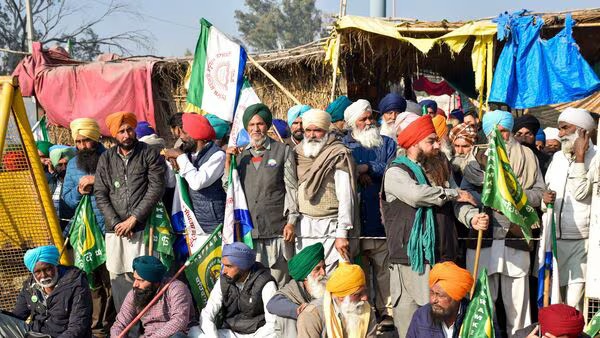A group of 101 farmers, part of the ‘Delhi Kooch’ march, faced police action at the Haryana-Punjab Shambhu Border on Saturday. Tear gas and water cannons were used to disperse the protesters, who were determined to advance toward the national capital to demand resolution on key agricultural issues, including Minimum Support Price (MSP).
Key Developments
- ‘Jathha’ Withdrawal for the Day:
- Kisan Mazdoor Morcha leader Sarwan Singh Pandher announced the temporary withdrawal of the ‘Jathha’:“Both forums have decided to withdraw the ‘Jathha’ today. We are hearing that 17-18 people have been injured. We will hold a press conference to share further plans.”
- Police Action at the Border:
- Police deployed tear gas and water cannons to stop the farmers’ march, citing security concerns.
- Tensions escalated as farmers urged authorities to allow their peaceful protest.
- A farmer leader appealed to the police:“We want to march to Delhi peacefully. Our voice should not be suppressed by these iron and stone barriers.”
- Farmers’ Allegations Against Government:
- Pandher criticized both the BJP government and opposition parties for ignoring farmers’ issues in Parliament:“The BJP wants to eliminate the farmers. Our voice reaches 140 crore people, but not the Prime Minister.”
- He questioned the Haryana Police’s actions:“How can 100 people walking on foot be dangerous for the country? Why block the border for 10 months?”
- Bajrang Punia and Political Support:
- Congress leader and wrestler Bajrang Punia, present at the site, condemned the government’s response:“The government says they are not stopping the farmers, but then uses tear gas. This is being treated like the Pakistan border.”
- Punia reiterated his support for the farmers’ MSP demand.
- Official Police Response:
- Ambala Superintendent of Police urged the protesters to adhere to the rules:“If you want to go to Delhi, take proper permission. A Supreme Court hearing was held, and the next meeting is on December 18. We request you to sit peacefully.”
- Health of Jagjit Singh Dallewal:
- Farmers highlighted the deteriorating health of Jagjit Singh Dallewal, convenor of the Samyukta Kisan Morcha (Non-Political), who has been on a fast-unto-death at the Khanouri border:“His deteriorating health is visible to everyone, including the Prime Minister.”
Why Are Farmers Protesting?
The ongoing farmers’ agitation centers around a charter of 12 demands, primarily:
- Legally guaranteed Minimum Support Price (MSP) for crops.
- Resolution of farmers’ grievances regarding agricultural reforms.
- Addressing broader issues related to rural livelihoods and fair compensation.
Government’s Stance
The authorities have emphasized that farmers must follow due process, including obtaining necessary permissions for protests. Heavy police deployment at the Shambhu border reflects the government’s intent to prevent further escalation while maintaining law and order.
Broader Implications
- The farmers’ movement, which began over contentious agricultural laws in 2020, continues to draw significant support, particularly from Punjab, Haryana, and Uttar Pradesh.
- The use of tear gas and water cannons has reignited criticism over the government’s handling of peaceful protests.
- With rising tensions and ongoing discussions scheduled, December 18 emerges as a critical date for determining the next course of action.
Conclusion
The farmers’ march at the Shambhu Border reflects renewed determination to push their demands despite heavy police resistance. While authorities cite security concerns, farmer leaders continue to question the government’s approach to addressing agricultural grievances. As tensions mount, the spotlight remains on the government’s response and the upcoming December 18 meeting.


